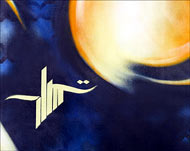British artist’s universal message
A humble-looking man in his 20s sits in his studio with a mask covering his mouth and a spray can in his hand as he begins to cover a canvas with different colours.

The shades merge, and in the midst are beautiful letters in Arabic spelling a single word – salam, which means peace.
Mohammed Ali is no ordinary artist. For the 26-year-old from Birmingham, United Kingdom, art is a fusion of ancient Islamic script mixed with a modern edge, adding appeal to a younger generation of art lovers.
Ali also has a message. “Spreading salam is a powerful, strong message. I choose words that inspire me but keep the art form as graffiti,” he told Aljazeera.net.
He chooses words such as dhikr (remembrance), sabr (patience) and ilm (knowledge) – words he says have a universal meaning regardless of race and religion.
“These are negative times for Muslims, so we should use all platforms – art is a universal means of communication; we need to create bridges between cultures and religions.
“Islam is about peace, and my art is a chance to explain what Islam is. I want to show that graffiti art can be inspired by your religion and it is not a contradiction.”
Influence
Ali has been painting from a young age. Growing up in 1980s Britain, he was influenced by the urban graffiti scene.
“I used to go to see graffiti art on the streets with my brother and was amazed by the ability [of] so many people to freely express themselves.”
 |
|
The Arabic word ilm, knowledge, |
When Ali was 10, there was an urban subculture in the UK: hip-hop music, break dancing and graffiti – “art for the people”.
Ali says: “You didn’t have to be from a certain class or background to appreciate the work; it was art everyone could understand. It was a very clear reflection of what youth were feeling, disillusioned by society, and it was a way to express feelings through art.”
But Ali was not part of the illegal graffiti movement; he used the style as inspiration, starting off his career in art by painting murals for community centres.
Renaissance
Ali pursued his interests and went on to study graphic design at university.
 |
|
The letters alif lam mim (above) |
He then joined a small group of collective artists calling themselves The Artists Circle, formed when they realised that Muslim artists lacked representation in Britain.
“Islamic art had frozen up, so we used modern techniques and styles to give it new life. This is the renaissance of Islamic art based in the Western world.”
His work has filled a void in the Islamic art market.
Ali’s art is for everyone but will probably appeal most to young Muslim professionals, who can afford his contemporary designs.
Ali’s work is getting interest from the corporate world, and he thinks Islam’s spiritual message coming across in any form can only be a good thing.
“My artwork is open to all who have an appreciation for art,” he says.
Exhibitions
Ali will be displaying his work in Dubai in his first exhibition outside the UK.
 |
|
Salam (above) is something Ali is |
“There is a thriving art scene in the Middle East, and I’d like to be a part of it,” Ali said.
September’s Dubai exhibition will be just the start; he also plans to exhibit his work in South Africa, America and Europe.
“I am using my art as a form of inspiration and as a means to get closer to my faith.
“Graffiti is about glorifying yourself by spraying your street names on walls, but the simple words I use are used to glorifying Allah.”